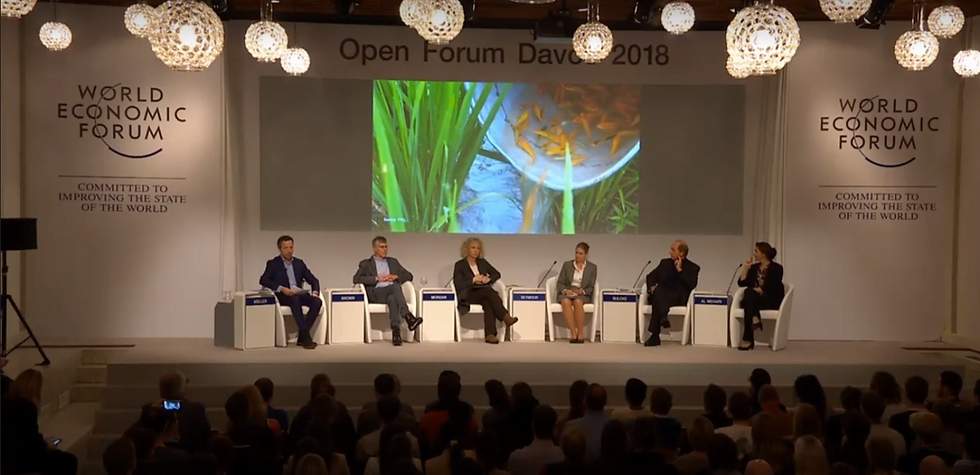DAVOS-KLOSTERS, SWITZERLAND – This year’s World Economic Forum meeting was as fascinating and thought-provoking as ever. The annual event brings together global leaders, decision-makers, and visionary thinkers, from private and public sector CEOs to presidents, all with the view to improve the state of the world and create a shared future. The challenge is to be able to distinguish between exciting vision and hyperbole, the line between the two being fine and blurred. It is important that we transition these ideas into action.

To give you a flavour of the four days and the people you come into contact with, I found myself in discussions with including Queen Rania of Jordan; ex-US Vice-President Al Gore; the Head of the Red Cross; the Managing Director of the World Bank; President Juan Manel Santos of Colombia; Peter O’Neill, the Prime Minister of Papa New Guinea; and the CEOs of Monsanto and Bayer. Interestingly, Davos is a village set in the bottom of a valley in the Swiss mountains, surrounded by pristine ski slopes. Yet a surprise was the level of air pollution – thick snow, heavy traffic and engines left running due to the cold meant the air was heavy with fumes. It was a topic of some discussion for those like me who walked the streets of Davos.
Agriculture was an important focus of discussions. The emphasis this year, however, was on thinking of the food system in its entirety – a distinct move from focusing on production and improving productivity. I joined several conversations aimed at co-developing solutions to improve a food system that is failing to provide a healthy and nutritious diet to nearly half the world’s population – with obesity prevalence catching up with the numbers of under nourished. Agriculture was also under discussion as a major emitter of greenhouse gas.
Here are my key takeaways from the conversations, which set an important tone for our sector this year.
Food system innovation is the next opportunity for technological disruption
Much was spoken about the lack of investment in our food system, and how it is behind other sectors in investment and in adopting innovations.
For example, since 2010 the food sector has attracted $14 billion in investments for around 1,000 technology start-ups – 1/10th of the money invested in healthcare, which has attracted $145 billion in over 18,000 start-ups. These findings were published in a new World Economic Forum report which was launched at Davos, “Innovation with a Purpose: The role of technology innovation in accelerating food systems transformation”. I attended a session ran by the Forum’s New Vison for Agriculture (NVA) to delve into the topic further. This was one of the most participative, enjoyable sessions and humorous session of the four days. The event was, however, tinged with sadness, as this was Lisa Dreier’s last Davos. Lisa, who has driven forward the global NVA program for the last 11 years has chosen to step down. We wish her well with the next chapter in her career.
The discussion focused on moving from away from identifying technologies to a systematic approach to implementing them. This brought a sense of optimism that transformative changes are coming. Indeed, we know that there are exciting food technologies out there. I met a number of start-up entrepreneurs while in Davos, one who is turning food waste into animal protein in the form of insects, and another who is developing a consumer mobile application which senses the quality of food.
By implementing innovations across the entire value chain – such as alternative proteins, food sensors, blockchain for traceability and mobile service delivery – technology can drive rapid progress in the sustainability, efficiency and health impacts of our food system.
Agriculture has a significant impact on nutrition and the environment
A sobering message which emerged from Davos was the scale of our global nutrition crisis, with the number of undernourished and obese people almost the same – over 700 million globally. While they are polar conditions, both hunger and obesity can be attributed to poor diets. The numbers of people globally who went to bed hungry increased last year. The role of the private sector in changing diets was a focus of our conversations, particularly in terms of helping consumers make better food choices, and agriculture as a solution. There was a strong feeling that we need to shift from traditional animal protein to more sustainable sources, such as insects, or by creating meat alternatives through scientifically engineered plant matter.
The point was also repeatedly made that agriculture has a significant impact on the environment. Preservation of our forests is a huge concern, yet we are losing ground. Over the last few years the number of displaced people is believed to have reached 70 million. Additionally, we were reminded that agriculture is a huge emitter of greenhouse gases (GHG). With the pace of positive transformation taking place within the energy sector, the agriculture and food sector is in danger of being seen a neophobe – resistant to change.
We must transition from ideas to delivery
As ever, Davos is principally a space for new ideas: their exchange, development, and cross-pollination. It was inspiring to hear some great minds at work and to co-develop this compelling narrative for the future of food systems. The challenge is distinguishing between vision and the ideas which will have the greatest real-life impact. It is our job now to focus on delivery – the “how to” – and convert these ideas into action.
